
| This page is devoted to analyzing five of the main characters from Neon Genesis Evangelion. These include: Shinji Ikari, Asuka Langely, Rei Ayanami, Misato Katsuragi, and the mysterious 17th Angel Kaworu/Tabris. If you want some more basic information about these characters, go to my other Evangelion page, which is more general. This section is more about the characters emotional problems, symbollism, and all that strange stuff. Spoilers ahead for anyone who hasn't seen Evangelion. |

| Shinji Ikari, the main character of Evangelion, has a lot of emotional problems that are key to the final events of Evangelion, namely, Third Impact. As a young boy, his mother died mysteriosly, and his father ignored him. After being deserted by his father, Shinji has always been afraid of being deserted by other people. He has what is called Hedgehog's Dilemma, and actual psychological condition. Hedgehog's dilemma is a case in which a person is afraid to get close to another human in any way due to their fear of being hurt (I.E. a Hedgehog can't get too close to another Hedgehog without thier spines hurting eachother). This condition has always made Shinji feel like an outsider. He has alwasy remained insecure about his feelings, and often has trouble relating to others. If he had his way, he would shut himself in his room and stay alone forever. At least, that's what Shinji thinks at the beginning of the show. |
| Of course, this isn't Shinji's only problem. The fact that he is an outcast brings up new problems. Firstly he begins to doubt his own self worth. Since he is insecure about relationships with other people, he assumes that everyone else hates him. He doesn't want to be hated, and he doesn't want to be hurt, so he shuns himself from others. Even when he is forced to interact with people he clearly shows a lack of relevance for his own life. He believes that he is worthless, and that he will always be alone. In short, Shinji is extremely pessimistic, at least for his own life. He seems to think that everyone else has it better than him. Now this is where Rei and Asuka come in. These two are the first people he has ever met that he can relate with, and in turn, can understand his own feelings. Rei Ayanami (see below) has the lowest regard for her own life and well being, a fact which surprises Shinji. She is the first person he has ever met who seemed to have a worse life than him, but it also allows the two to communicate with eachother on equal grounds. |
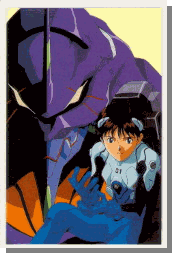
| Asuka may seem outgoing, but she has her own set of problems, and soon even she and Shinji can understand each other's problems. Secondly, Shinji seems to derive much of his emotional problems from the state of the world. Throughout the series, Shinji makes remarks about how reality is bad (to quote: "It sucks") and that he would rather run away from it. This really means that what he really wants to do is run away from the imperfect problems of the world, especially his own problems. This becomes essential to his decision in Third Impact/Human Instrumentality. It isn't until the end that shinji realizes that reality isn't that bad, but that he only views it in that way. He learns that he isn't worthless, he just assumes that he is. At first, Shinji believed that the only reason people were being nice to him was because he was an Eva pilot, but once the need for Eva's has passed, Shinji once again feels alienated. However, at this moment, his friends and even strange, ghost-like visions of his mother help him understand that he only thought everyone hated him. Its mind over matter. "Anyplace can be heaven as long as you try to live." Since Shinji is instrumental to Third Impact, you can read more about Shinji's ultimate discovery in the Third Impact section. |
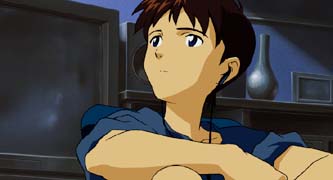
| Shinji is nearly an existentialist. He isn't one technically, but he does follow some trends. He seems to think that he will always be alone; that he is destined to be alone. This is just one of many things that are a result of his lack of confindence. Since Shinji is the most insecure member of the main cast, it is only fitting that he be the instrumental person during the Human complementation project. Once he analyzes himself, he soon learns that his life is not so bad. Shinji was once a man who thought that the world hated him, that his existence was worthless, and that life was nothing but a hell. He believed in running away from the bad aspects of the world, but at the same time he hated himself for running away (which just served to enforce his own self doubt). It isn't until the very end that Shinji drops all of this beliefs. His change isn't immediate, but it is clear upon the line "I hate myself, but...but maybe I could love myself" that he has begun to realize that life can be good as long as you try to live a good life. |
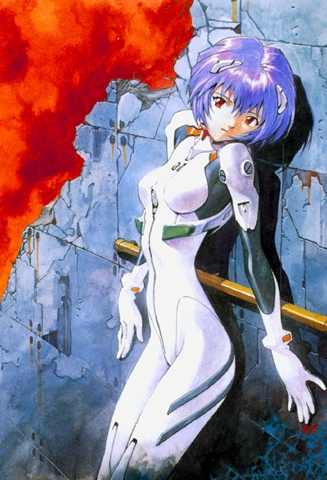
| Rei Ayanami is a very interesting individual, despite her peculiar history and lack of emotions, Rei is a very important symbol of the search of individuality as well as value of one's own existence. Born in a laboratory in the lower levels of Nerv, Rei is a clone created from both the DNA of Gendo's dead wife Yui,and of the creature known as Lilith. Rei does not have a soul of her own since she is a clone, but she carries a soul within her: Lilith's soul. Since there is only one soul, there can be only one Rei at a time. However, if Rei should die, there are countless Rei clones waiting in Central Dogma just waiting to recieve the soul. Rei seems insecure about her life, her value, and her individuality. The thing is, she has every right to be. If she should die, she would be replaced. How can one have value for their life if they can be replaced like a broken glass? What value can Rei find in herself if she is a clone? How can she see herself as a unique person when hundreds of clones exist? Despite the fact that Rei remains emotionless for most of the series, Rei actually makes a lot of progress into analyzing herself. There are more than a few instances in the series in which she begins to ponder herself as an individual, most notably episode 14 "Seele: Throne of Souls." At first, Rei sees herself not as a human, but as a thing. She cannot feel human emotions, and she is regarded by Gendo Ikari as a tool to be used for Third Impact. Then along comes a boy named Shinji Ikari. Their common problems about finding a place in society almost makes them kindred spirits. The fact that Rei is born of Yui's blood increases their connections even more. When Shinji is nice to her, Rei begins to feel accepted. No one has ever done anything for her before, except Gendo. Note that when Shinji picked up her room for her, she blushed, and for the first time in her life, she said "Thank you." We can see that she begins to evolve as the series goes on. She begins to experience some emotions, and suddenly becomes confused by the way Shinji treats her. |
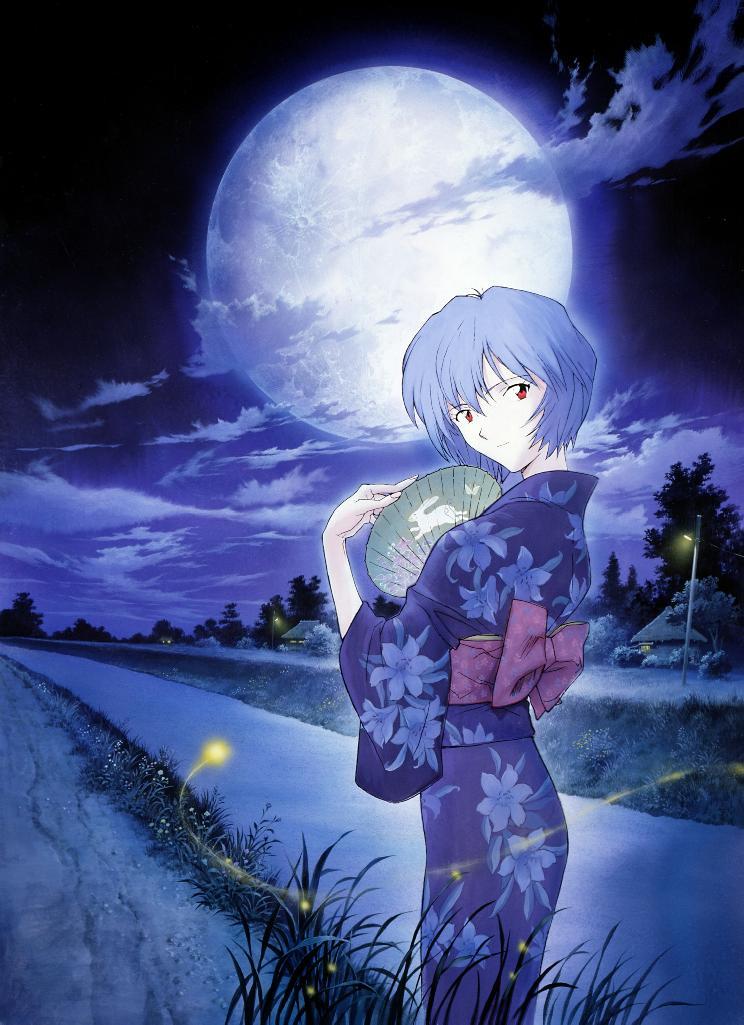
| So what does all of this mean. Well, the important thing is to talk about the events of episodes 25. This is where Rei finally comes to a conclusion about herself. During the psychological sessions of the characters, Rei is forced to talk with clones of herself which begin to tell her that she is a doll, a clone and nothing more. Rei rejects this claim, stating that she is an individual. How? Rei points out that while all of the Rei clones were the same physically, and possessed the same mind and soul, they lacked the personal experiences she has had with other people. Through interaction with other people, namely shinji Ikari and Asuka, Rei has shaped an identity that the other clones lack. This ends up being an important underlying theme in Evangelion, that the way other people in society percieve you is just as important as how you percieve yourself. Rei has now come to the conclusion that she is an individual. She is still confused about human emotions, but at least now she has found value in her life. Furthermore, all of the other Rei Clones were destroyed by Ritsuko near the end. Now Rei truly is unique. There will never be another Rei after her. Rei is a symbol of everyone who wants to discover the value of their existence and their place in society. Sure, no one is a clone like Rei, but the connection is still there nonetheless. It is a classic example of the 'search for an identity' that has become so familiar in the human condition. |
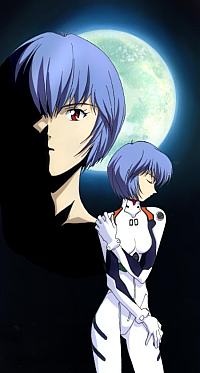
| While Shinji seems to think about a lot of things, ranging from the value of his existence, to how good/bad his life is, Rei concentrates on the journey for identity. She believes that while her perception of herself is significant, it is also important to consider how others percieve you. By examining how others view you, you can better understand yourself. As shown in episode 26, your existence is almost meaningless without someone else to relate with because you are alone, with nothing to justify your existence. Rei takes this philosophy into account and with it, she creates an identity for herself. It is clear when Rei says "I wanted him to return me to nothing, but now I fear it," that she has attained relevance for her life. |

| If one asks a psychologist why some people are arrogant or mean to others, such as the classic "Bully," they might say that the person is actually quite sad, perhaps even traumatized, by something. These people often make fun of others, but its not because they want to make you feel bad. In fact, its because they want to feel better. By making other people seem inferior to them, and be acting arrogant and/or selfish, the person believes that they are better than others, thus erasing the sadness/pain they normally feel. This is nothing more than gaining personal pleasure at the expense of anothers pain. This is exactly what Asuka Langely Sorhuu is. When she first appears, the audience often has one word to describe her. Its a word that rhymes with witch, though that word may also be used. From the beginning, Asuka gives off the impression that she is arrogant, selfish, and constantly oppressing people. She treats Shinji like a nobody, calls Rei a 'doll,' and believes that she is the best Eva pilot there ever was. Well, there is a reason why this fiery red head is so fiery to begin with. As a child, Asuka went through some extremely hard times. While Shinji is searching for value and while Rei is searching for identity, Asuka is an example of how humans try to escape a horrible past. |
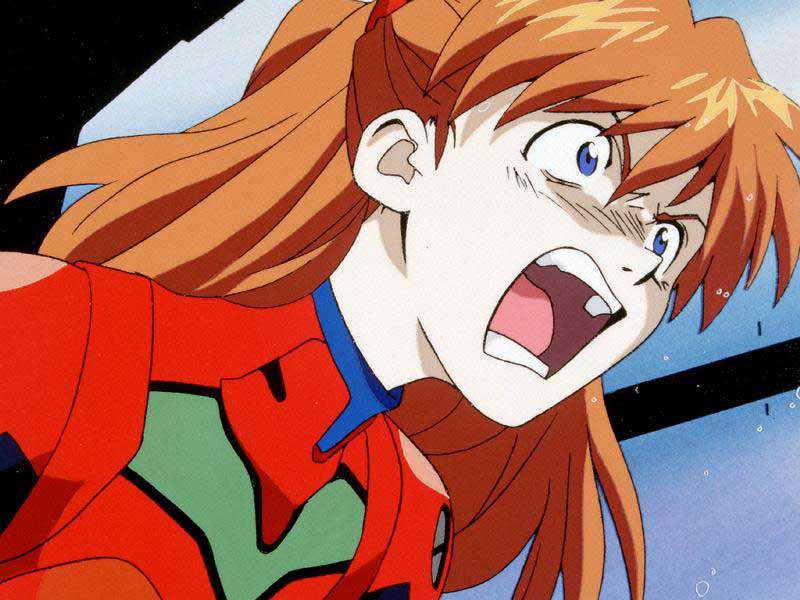
| As a young girl, Asuka was chosen to be an Eva pilot, and was the happiest child in the world at that time. However, her mom was terribly ill. It is theorized that she lost her sould due to an accident involving Evangelion unit 02, but whatever the case, her mother began to lose her sanity. Her mom would often hold a little doll in her hand and call it Asuka, meanwhile referring to her actual daughter as "That little girl over there." Asuka was raised without a mother, and furthermore, blamed her father for her mother's condition. In effect, she grew up with almost no parental rolemodels. Asuka chose to become as independent as possible. She was angry, sad, and desperate at the same time. Even worse was the day that she ran in to tell her mom that she had been chosen to be an Eva pilot, only to find her hanging from the ceiling. Her mothers suicide enforced her desire to be independent. She claims that she doesn't need anyones help, that she will take care of herself. It is here that Asuka begins to contradict herself. For you see, Asuka is really a traumatized child, not a mean, arrogant person. She attempts to hide her pain and sorrow with a false personality, which has become a sort of Mask. She hides her memories deep within her mind, never once thinking about them. She constantly puts others down to make herself feel better, and accepts help from no one. She believes she is the best, for that is the only way to escape her pain. After Arael "Mind Rapes" her however, she can no longer run away from her feelings. We see that she is really a person who doesn't want to be alone, and yet her arrogant persona often repels people. She is afraid of being abandoned, much like Shinji is, and she claims to hate everybody (but at the same time she requires companionship). It is unclear what discovery Asuka makes during her analysis in the final episodes, though it is clear that she has accepted her life and rejects instrumentality (as shown in EOE when she is back on the beach with Shinji). Perhaps she has finally decided to accept the past and move on, rather than try to avoid it. Her interactions with Shinji has also made her realize that she needs others. No human is meant to be alone. In fact, Instrumentality was meant to fix that problem, but Asuka saw that Instrumentality was wrong and thus rejected it. For more information, see the Third Impact section. |
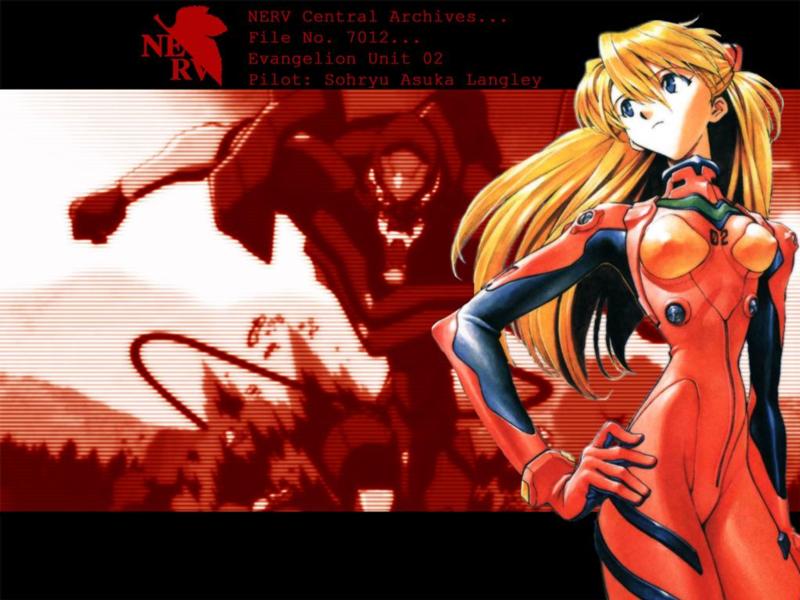
| Asuka is one of the harder characters to analyze. We can sympathize and understand where she is coming from at the very least. She is a traumatized child. She seeks acceptance by proving that she is the best. She acts bossy and arrogant to hide her pain. Yet we are not completly sure what Asuka gains during the series. In the beginning, she seems to think that she doesn't need anybody, and that everyone in the world will hate her unless she proves her worth. She even claims that she is useless now that she can no longer pilot her Evangelion. Fact is, the Evangelions themselves may have only served as an escape for Asuka and Shinji. They were a way to show their worth; a way to be popular. In the end, Asuka was forced to deal with her past because she had lost her piloting abilities. After episodes 25 and 26, Asuka seems to confront her past and ultimatly accepts it. What does she believe now? Well, we can only speculate that she now believes that humans are not meant to be alone, and that she doesn't have to prove anything to be accepted by others. |